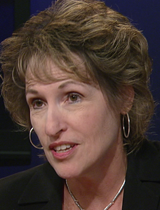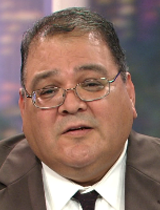The post-recession economy, based on knowledge and talent, is challenging higher education to change how it operates, say the presidents of Arizona's two biggest universities.
One strategy for the state's universities is to stop competing with one another and instead collaborate to compete with other markets globally, the two presidents agreed, speaking at a forum at the Tucson Regional Economic Opportunities annual luncheon this week.
Their comments were recorded for Friday's Arizona Week broadcast. See the full forum here.
 Eileen McGarry, director of UA Career Services.
Eileen McGarry, director of UA Career Services.“We are the future of Arizona," University of Arizona President Ann Weaver Hart said. "Arizona needs both of our research universities to succeed, to succeed together and to be good partners in creating a strong economic environment where people want to be.”
Arizona State University President Michael Crow agreed and added that purposefully disrupting the current educational system - as technology has disrupted many traditional aspects of the economy - is a key to the knowledge economy.
"How do you drive disruptive economic transformation?" Crow asked. "You've got to create more disrupters. So that means you've got to go into the universities, you've got to find ... ways to create people who are not hind-bound to a single discipline, who do not think about one path only."
As if confirming his point, UA Career Services Director Eileen McGarry said in an Arizona Week interview that recruiters at one big national financial institution told her they are interested in UA students across the bounds of disciplines.
"We have as many companies looking for diversity across disciplines as we may have looking at very specific, specialized and focused talent," McGarry said. "For example, one of our top finance companies ... came to me and said they really selected us because we represent diverse thinkers.
 Joseph Garcia, director, Latino Public Policy Center at ASU's Morrison Institute for Public Policy.
Joseph Garcia, director, Latino Public Policy Center at ASU's Morrison Institute for Public Policy."That's one of the things they're looking for in their company," she said. "It's not a specialized area, but the fact that they can recruit students who are culturally aware and culturally diverse and represent many disciplines and can bring those together to lead a company."
Cultural diversity is one area of focus - and worry - for some in Arizona's economy because of the growing numbers of Latinos, who are not keeping pace in higher education.
"All the state universities are on board to try to represent the population," said Joseph Garcia, director of the Latino Public Policy Center at ASU's Morrison Institute for Public Policy. "Obviously we're not there yet. ... The problem is that as you look at Latinos as a whole, Latinos, just because they enter college, does not mean they finish college. They finish college at a lesser rate than their white counterparts."
Garcia said 9 percent of Arizona Latinos between the ages of 24 and 34 have bachelor's degrees, compared with more than one-fourth of the population overall.
He said the lag could mean economic trouble for Arizona because "as Latinos move more and more into the workforce, Latinos aren't represented in the high-skilled, high-compensated workforce that you're looking for to be able to compete."



By submitting your comments, you hereby give AZPM the right to post your comments and potentially use them in any other form of media operated by this institution.